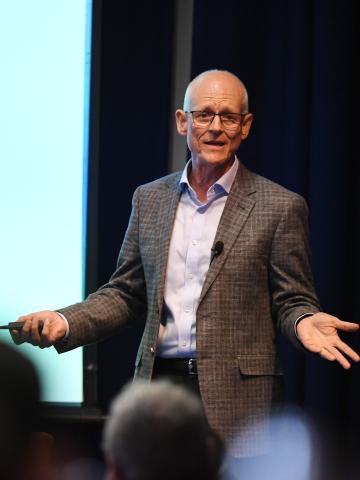
by Professor Jeff Brand
For today’s students, the future can feel more uncertain than ever.
They’re not just navigating subject selection, final exams and university applications, they’re staring down a job market being reshaped by artificial intelligence.
It’s no longer a question of if AI will change the world of work, but how deeply and how fast.
As an educator and a parent, I know how much we worry about our children’s future, and that the decision-making process can feel like a minefield.
But the future of work isn’t a story of obsolescence, it’s one of evolution and opportunity.
University graduates, for example, don’t need to fear being replaced by AI – they will be the key to managing it well.
Graduates need to see themselves as lower middle managers from day one. The difference is they won’t be managing people, they will be leading a workforce of generative AI tools.
And graduates will need to do what managers at that level do now - checking the quality of their team’s output, guiding them well and providing clear direction and feedback.
This is the new reality of work. AI will disrupt jobs, not eliminate them.
But students must be more than just literate in how to use these tools, they need to be fluent. That means knowing when to use AI, when not to, and how to lead with it.
At Bond University, we’re not just preparing students for this future; we’re building it into the curriculum.
A new tiered AI guide, set to roll out next semester, will help students understand how AI can be used in assessments, ranging from prohibited use in exams to scaffolded integration in projects.

It’s about developing discernment, not dependency.
But AI fluency alone won’t be enough. The careers of the future will demand more than technical skills.
Creativity, critical thinking and human connection will also be crucial. That’s where higher education plays a vital role, and we must ensure we’re delivering.
For me, there is so much joy in how we go about learning and teaching in the age of AI.
This is exactly why we are here as educators - the world changes and it changes quickly, so we need to adapt the way we teach and what we teach to ensure our students are job-ready from day one.
This also means rethinking how we define careers. We still use labels like ‘lawyer’ or ‘accountant’ because they’re familiar.
The reality is those roles are evolving. What matters is the processes you learn - how you think, how you lead and how you adapt.
All of this starts well before university. Choosing school subjects can feel overwhelming, especially when students are just 15 or 16 years old and being asked to map out the rest of their lives.
My advice? Start with conversations. Talk about interests, aptitudes, and aspirations.
Subjects like maths, sciences and English can build a strong foundation onto which students can layer electives and micro-credentials that spark curiosity and passion.
ATAR scores still matter, but they’re only one part of the equation.
What students do outside the classroom in terms of work experience, extracurricular activities, and vocational training can be just as important.
There’s also huge value in real-world experience, whether that’s a part-time job, an internship, or a short placement.
Being out in the workforce teaches students how to collaborate, communicate, and discover what they’re great at and what lights their fire.
Institutions that focus on human connection, in-person learning and emotional intelligence will give students an edge by mirroring professional environments, where deadlines, quality control and collaboration are key.
Maintaining our own agency and creativity is also critical.
AI can do amazing things, but it’s essentially an algorithm based on original human knowledge and ideas, which means we need to keep creating them.
We need students to graduate from university as creative critical thinkers to keep our economy afloat.
My message to future students is to choose subjects and a degree that teaches you how to think, not just what to know, and find a place that helps you grow, not just graduate.
- Professor Jeff Brand is Deputy Provost Education at Bond University.